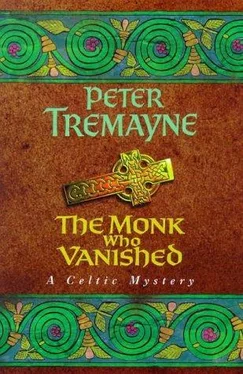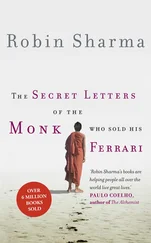Peter Tremayne - The Monk Who Vanished
Здесь есть возможность читать онлайн «Peter Tremayne - The Monk Who Vanished» весь текст электронной книги совершенно бесплатно (целиком полную версию без сокращений). В некоторых случаях можно слушать аудио, скачать через торрент в формате fb2 и присутствует краткое содержание. Жанр: Исторический детектив, на английском языке. Описание произведения, (предисловие) а так же отзывы посетителей доступны на портале библиотеки ЛибКат.
- Название:The Monk Who Vanished
- Автор:
- Жанр:
- Год:неизвестен
- ISBN:нет данных
- Рейтинг книги:3 / 5. Голосов: 1
-
Избранное:Добавить в избранное
- Отзывы:
-
Ваша оценка:
- 60
- 1
- 2
- 3
- 4
- 5
The Monk Who Vanished: краткое содержание, описание и аннотация
Предлагаем к чтению аннотацию, описание, краткое содержание или предисловие (зависит от того, что написал сам автор книги «The Monk Who Vanished»). Если вы не нашли необходимую информацию о книге — напишите в комментариях, мы постараемся отыскать её.
The Monk Who Vanished — читать онлайн бесплатно полную книгу (весь текст) целиком
Ниже представлен текст книги, разбитый по страницам. Система сохранения места последней прочитанной страницы, позволяет с удобством читать онлайн бесплатно книгу «The Monk Who Vanished», без необходимости каждый раз заново искать на чём Вы остановились. Поставьте закладку, и сможете в любой момент перейти на страницу, на которой закончили чтение.
Интервал:
Закладка:
It was a royal stag on a blue background.
‘That’s a Eóghanacht banner!’ she gasped.
The horsemen were galloping across the plain towards the abbey.
Fidelma turned to Eadulf. There was relief suddenly on her face. ‘I believe that they are men from Cnoc Aine,’ she said, excitement in her voice. ‘They must have come in answer to the tolling of the abbey bell.’
‘It would make sense as to why the attackers are leaving so hurriedly.’
‘Let us go down and tell the others.’
At the foot of the tower they found Brother Tomar and Abbot Ségdae. He looked slightly strained and pale and there was a bluish lump on his forehead but he seemed in control again. A trumpet note was echoing in the air as the column of horsemen approached the abbey. Abbot Ségdae recognised it. Fidelma did not have to explain.
‘Deo gratias!’ breathed the abbot thankfully. ‘We are saved! Quick, Brother Tomar, open the gates. The men of Cnoc Aine have arrived to give us aid.’
As the abbey gate swung open, the column of horsemen came to a halt in front of them. They were led by a young, good-looking, dark-haired warrior, richly clad and equipped for battle. He was evenly featured, with curly close-cropped red hair and dark eyes. He wore a blue woollen cloak fixed at the shoulder with a silver brooch. It was quite distinctive, wrought in the shape of a solar symbol with semi-precious garnets on each of the three radiating arms.
His eyes fell on Fidelma as she emerged through the gates, with the others, to greet them. His features split into a broad smile.
‘Lamh laidir abú! ’ he cried, raising a clenched fist in greeting.
Eadulf had been long enough in Muman to recognise the battle cry of the Eóghanacht. A strong hand to victory!
‘You are welcome, cousin Finguine,’ Fidelma replied, also raising her clenched fist in greeting.
The young man leapt from his horse and embraced his cousin. Then he stood back and gazed around in dismay.
‘But I have arrived late rather than early,’ he said in disappointment. ‘Thank God that He has cast His mantel of protection over you, cousin.’
‘The raiders left riding towards the north only minutes ago,’ Eadulf offered.
‘We saw them,’ the Prince of Cnoc Aine nodded, glancing at him and observing his Saxon accent and tonsure. ‘My tanist and half of my men have already started in pursuit. Who were they? Uí Fidgente?’
Fidelma had to admit that it was a logical assumption. It was inthis very area, indeed, at Finguine’s very capital at Cnoc Aine, that the last great battle had been fought with the Uí Fidgente scarcely a year before.
‘It is hard to say, but the Prince of the Uí Fidgente is at Cashel, supposedly engaged in peace talks with my brother.’
‘So I have heard,’ observed Finguine dryly. His expression conveyed how much he distrusted such an event. But now he turned to the Abbot Segdae, noting his bruise. ‘Are you badly hurt, Father Abbot?’
Ségdae shook his head as he greeted the youthful Prince. ‘A bruise, that’s all.’
‘Has harm come to any other of the brethren? Are you all well?’
‘The most harm has been done to the township,’ replied the abbot, his face still anguished. ‘We have suffered one Brother killed and one bruised, like myself. But there must be many dead in the township. And, look …’
Finguine followed his gaze as did everyone else.
‘The sacred yew-tree of our race — destroyed!’ cried Finguine, his voice a cross between horror and rage. ‘There will be much blood to pay for this. This is an insult to all Eóghanacht. It will mean war.’
‘But war between whom?’ Fidelma posed the question without humour. ‘Firstly, we must identify those responsible.’
‘Uí Fidgente,’ snapped Finguine. ‘They are the only people who will benefit from this.’
‘It is an assumption only,’ Fidelma pointed out. ‘Never act before you know for sure.’
‘Well, we have captured one of the raiders,’ Eadulf reminded them. ‘Let us question him and make him tell us who he takes his orders from.’
Finguine appeared surprised at the news. ‘You have actually captured one, Saxon?’ He sounded impressed.
‘Well, Fidelma did the capturing,’ Eadulf corrected disarmingly.
Finguine turned to his cousin with a grin. ‘I should have known that you had a hand in it. Well, where is he? Let’s us see what we can get out of the cur.’
They walked back into the courtyard of the abbey, after Finguine had issued orders to his men to fan out through the township and see what they could do to help the injured and to quench the fires.
‘He is trussed up over here,’ Eadulf said, leading the way to where they had left the surly warrior.
The man was lying where they had left him, his back against the abbey wall, hands tied behind him, his legs outstretched beforehim, still tied at the ankles. His head was slumped forward a little on his chest.
‘Come on, man,’ cried Eadulf, moving forward. ‘Rouse yourself. It is time to answer a few questions.’
He bent and touched the warrior lightly on the shoulder.
Without a sound the warrior rolled over on his side.
Finguine dropped to his knee and placed his hand on the pulse in the man’s neck.
‘By the crown of Corc of Cashel! Someone has revenged themselves on this man. He’s dead.’
With an exclamation of surprise, Fidelma moved forward to her cousin’s side.
There was blood on the man’s chest. Someone had stabbed him through the heart.
Chapter Thirteen
Night had made the raid seem more destructive than it had been in reality. There were a score of dead from the town and a further dozen or so were wounded or injured. Only half a dozen buildings had been burnt down. A few more buildings were damaged, though not beyond repair. Even so, the effect on such a small community as Imleach was devastating. Among the main buildings destroyed was the smith’s forge, a warehouse and the inn that had belonged to Cred.
Abbot Ségdae and Brother Madagan, wearing their bandaged foreheads like insignia of distinction, had turned lauds into a short service of thanksgiving for the safe delivery of the abbey. Even the burly Samradan was there, looking somewhat shame-faced and irritable. Fidelma and Eadulf set off with her cousin, the Prince of Cnoc Aine, to walk to the town in order to assess the damage for themselves.
Little was said about the great yew-tree whose wood still smouldered in front of the abbey. Its destruction was beyond mourning.
The first person they saw as they walked across the square was Nion the smith, the bó-aire. Nion was leaning heavily on a stick and his leg had been bandaged. He wore a long woollen cloak wrapped around him against the morning chill. It was fastened at the shoulder by a silver brooch in the design of a solar symbol with three red garnets, similar to the one Finguine wore. He was staring morosely at the remains of his forge while his assistant, Suibne, was picking through the rubble. As they approached, they could smell the acrid stench of burnt wood mingling with other odours which they could not begin to identify, all rising together to make the atmosphere corrosive and caustic in their lungs.
Nion did not glance up as they approached.
‘It is good to see you alive, Nion,’ Finguine greeted him. He seemed to know the smith of old.
Nion looked up, recognising the Prince of Cnoc Aine, and bent his head slightly forward in acknowledgement.
‘My lord, thank God that you came in time. We might all have been slain and the whole town destroyed.’
‘Alas, I did not arrive in time enough to spare your loss, Nion,’replied the Prince of Cnoc Aine, looking grimly over the ruins of the forge.
Читать дальшеИнтервал:
Закладка:
Похожие книги на «The Monk Who Vanished»
Представляем Вашему вниманию похожие книги на «The Monk Who Vanished» списком для выбора. Мы отобрали схожую по названию и смыслу литературу в надежде предоставить читателям больше вариантов отыскать новые, интересные, ещё непрочитанные произведения.
Обсуждение, отзывы о книге «The Monk Who Vanished» и просто собственные мнения читателей. Оставьте ваши комментарии, напишите, что Вы думаете о произведении, его смысле или главных героях. Укажите что конкретно понравилось, а что нет, и почему Вы так считаете.












